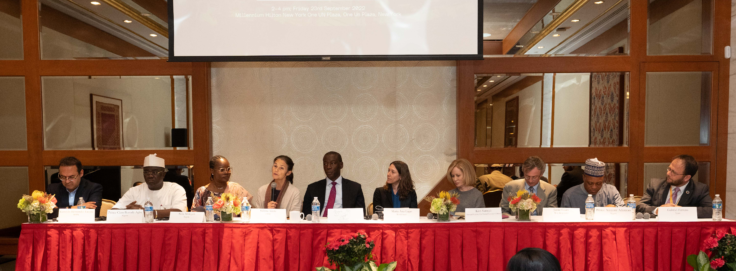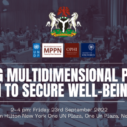
Search
Innovations, collaborations and forthcoming MPIs shared at UNGA 77 Side Event hosted by Nigeria

26 September 2022 – The Multidimensional Poverty Peer Network (MPPN) and the Federal Government of Nigeria co-hosted a high-level in person side-event at the 77th United Nations General Assembly on Friday 23 September convening world leaders and policymakers to discuss the topic ‘Driving multidimensional poverty reduction to secure well-being for all’.
At the event, co-organized with the Oxford Poverty & Human Development Initiative (OPHI) at the University of Oxford, twenty-one high-level representatives from countries and international agencies shared the innovative and collaborative ways in which multidimensional poverty indices are being used to drive multidimensional poverty reduction and secure well-being.
Nigeria shares details of forthcoming MPI
High-level representatives from Nigeria shared details of the forthcoming national MPI 2022 for Nigeria, which will be launched soon. Nigeria’s national MPI will use the largest MPI Survey yet fielded, to embed the MPI into poverty reduction policies at the state and district levels. President Buhari’s reflections, articulated by Zainab Ahmed, Minister of Finance, Budget and National Planning, emphasized how Nigeria’s MPI ‘is a powerful tool to galvanise action.’ Nigeria’s MPI 2022 includes disaggregation for 109 senatorial districts for the first time in Nigeria. Prince Adeyemi Adeniran, Statistician General, National Bureau of Statistics, outlined how this MPI will allow for more accurate targeting, identifying where multidimensional poverty is concentrated and providing a high-resolution lens on the composition of poverty.
Prince Clem Ikanade Agba, Minister of State, Budget and National Planning of Nigeria shared details of how the national MPI will be used to guide the medium-term National Development Plan 2021–2025 and the 2022 –2025 National Poverty Reduction with Growth Strategy, while Peter Hawkins from UNICEF drew attention to the Child MPI that links to the national MPI for Nigeria and makes visible the distressing situation of children across eight additional early child development indicators. Raymond Gilpin from UNDP articulated UNDP’s support for the next chapter of Nigeria’s leadership in poverty programming, in which actors from local to national use the rich MPI database to design and implement evidence-based policy so millions step out of poverty, which is Nigeria’s noble objective in this process.
MPIs on the horizon, innovations and uses discussed
The Honorable Prime Minister of Bhutan’s address, delivered by the Minister of Foreign Affairs, called on respondents to balance and vitalize work on poverty reduction with measures and efforts to nurture profound well-being – what Bhutan calls Gross National Happiness – which also encompasses the environment, relationships, psychological and spiritual well-being, balanced time use, and good governance. Doing so will unlock creative energies that are so needed at this time.
The Vice President of Peru and El Salvador and Ministers from Costa Rica and Bhutan, shared details of the policy uses of the MPI including its efficacy for budgeting. Vice President of Peru, Dina Boluarte, and OPHI ExEd alumna, described how in Peru, the National Policy for Development and Social Inclusion hopes to incorporate the MPI to guide social programs, budget allocation and efficiently target government interventions. Arnoldo André Tinoco, Minister of Foreign Affairs, Costa Rica reported how in Costa Rica the MPI had helped to re-evaluate budget allocation during the pandemic, through identifying inequalities and expanding social security based on the deprivations measured by the MPI.
Ministers also demonstrated how MPIs guide innovative approaches to poverty reduction in Pakistan, Egypt and Cambodia. Ahsan Iqbal Chaudhary, Minister for Planning, Development and Special Initiatives, Pakistan spoke of the devastation of floods that affect 33 million persons at present, and announced the new MPI headlines for Pakistan using the latest update. In Egypt, which plans to launch an MPI in due course, Hala Helmy ElSaid, Minister of Planning and Economic Development, described the newly launched Egypt Impact Lab which aims to strengthen the effectiveness of Egypt’s poverty reduction policies and incorporate multidimensional approaches to poverty. In Cambodia, Samheng Boros, Secretary of State of the Ministry of Social Affairs, Veteran and Youth Rehabilitation, reported that the Ministry of Planning, line ministries, UNDP and OPHI are collaboratively building a Multidimensional Vulnerability Index, so-called to respect sensitivities around the word poverty.
Other countries reflected on their responsibilities towards the SDGs. Vice President of El Salvador Felix Ulloa observed that ‘poverty reduction is a fundamental factor in order to make progress in other areas,’ such as security and reaffirmed El Salvador’s commitment to SDG 1 to end poverty. Besides offering a splendid and detailed display of current policy uses of MPI, Jorge Iván González, Director of the Department of National Planning, Colombia also shared the importance of the national MPI in supporting the SDGs.
At the event, co-organized with the Oxford Poverty & Human Development Initiative (OPHI) at the University of Oxford, twenty-one high-level representatives from countries and international agencies shared the innovative and collaborative ways in which multidimensional poverty indices are being used to drive multidimensional poverty reduction and secure well-being.
The event was co-organized with the Multidimensional Poverty Peer Network (MPPN), a network of senior policymakers from more than 60 countries and 19 international organizations focused on measuring and reducing multidimensional poverty. The Oxford Poverty and Human Development Initiative (OPHI) is the Secretariat of the MPPN.
International agencies reaffirm their commitment in current context
A raft of key institutions explained the increasing relevance of multidimensional poverty measurement and reduction in present times. Rola Dashti, Under Secretary-General, Executive Secretary of ESCWA, noted how policy applications of the MPI animate major priorities including investment in the public health sector, quality education, and resilient social security. Haoliang Xu, Assistant Secretary-General, Assistant Administrator, UNDP, quantified today’s tough context, in which for first time in 32 years, human development declined for two years in a row. He stressed how work using the MPI is responding, with India and Uganda releasing their MPI reports, Belize, Guyana, Uruguay Viet Nam and Nigeria being among countries finalising or making major innovations on MPI with UNDP support; with a Massive Open Online Course training thousands, UNDP-OPHI’s global MPI analysis profiling disparities across ethnicity, caste and gender; and a new UNDP-OPHI Handbook on “How to Use National MPIs as a Policy Tool: From Metrics to Policy” distilling how countries around the globe have already used the MPI to better target, prioritize and allocate resources where they are most needed.
Maria Ana Lugo, Senior Economist of the World Bank, shared details of the World Bank’s support for national MPI SDG reporting across the world and their support for strengthening data collection. The Vice President of IsDB announced the publication a new IsDBI-OPHI policy brief series exploring the multidimensional poverty of Member Countries to serve as a foundation for evidence-based policy, including a cutting-edge report on MPI in Afghanistan with a new tangible and actionable portrayal of provincial data. Gabriel Ferrero of The UN Committee on World Food Security shared how in the face of the cost of living, a multidimensional lens such as MPI and WEAI is vitally important to catalyse transformative progress in the most cost-effective way.
More reasons for hope
Several hopeful notes were struck amid the challenges shared. In the face of multiple crises from the COVID-19 pandemic to several natural disasters, the Governor of Oaxaca Alejandro Murat Hinojosa described how Oaxaca, one of the poorest states of Mexico, had achieved the largest reduction in poverty in its history, attributing the success to using MPIs for measurement and targeting resource allocation based on the most deprived areas.
Jamie Coats, CEO of the Wise Responder, encouraged attendees to take advantage of the moment to reach out to the investment community and involve the private sector in their programmes to reduce poverty because these are looking to use ESG and social bonds to support such work. The exhilarating event closed with words by Kim Samuel, founder of the Samuel Centre for Social Connectedness and Visiting Scholar to OPHI. She reflected on the human value of events such as these and the achievements of the Multidimensional Poverty Peer Network in providing a forum for leaders to come together, encourage one another, and share lessons learned via this ‘community of connection,’ so that in these difficult times, no professional fights poverty alone.
Agenda
Leadership Panel
- E. Muhammadu Buhari GCFR, President of the Federal Republic of Nigeria ably represented by Her Excellency, Dr Zainab Ahmed, Honourable Minister of Finance, Budget and National Planning
- Rola Dashti, Under Secretary-General, Executive Secretary of the Economic and Social Commission for Western Asia, ESCWA
- E. Tandi Dorji, Minister of Foreign Affairs, obo the Prime Minister, Royal Government of Bhutan
- Haoliang Xu, Assistant Secretary-General, Assistant Administrator and Director of the Bureau for Policy and Programme Support (BPPS), UNDP
- E. Dina Boluarte, Vice-President and Minister of Social Development, Peru
- Mansur Muhtar, Vice President, Islamic Development Bank, IsDB
- E. Felix Ulloa, Vice President, El Salvador
Ministerial Panel
- E. Prince Clem Ikanade Agba, Minister of State, Budget and National Planning, Nigeria
- E. Hala Helmy ElSaid, Minister of Planning and Economic Development, Egypt
- E. Samheng Boros, Minister Attached to the Prime Minister and Secretary of State of the Ministry of Social Affairs, Veteran and Youth Rehabilitation, Cambodia
- E. Arnoldo André Tinoco, Minister of Foreign Affairs, Costa Rica
- E. Ahsan Iqbal Chaudhary, Minister for Planning, Development and Special Initiatives, Pakistan
- E. Alejandro Murat Hinojosa, President CONAGO, Governor of Oaxaca, Mexico
- E. Gabriel Ferrero, Ambassador at Large for Global Food Security, Ministry of Foreign Affairs, European Union and Cooperation, Spain.
SDG and Innovations Panel
- E Prince Adeyemi Adeniran, Statistician General, National Bureau of Statistics, Nigeria
- Raymond Gilpin, Senior Economist, Regional Bureau for Africa, UNDP on behalf of E Ahunna Eziakonwa, Assistant Secretary General and Regional Director for Africa, UNDP
- Peter Hawkins, Country Representative of Nigeria, UNICEF
- E. Jorge Iván González, Director of the Department of National Planning, Colombia
- Maria Ana Lugo, Senior Economist, World Bank
- Jamie Coats, CEO Wise Responder
Closing Address:
- Kim Samuel, Founder Samuel Centre for Social Connectedness and Visiting Scholar, OPHI
Moderators:
- Sabina Alkire, Director of OPHI, University of Oxford
- Sola Afolayan, National Coordinator, MPI, Nigeria
- Gonzalo Hernandez Licona, Director of MPPN, OPHI, University of Oxford
Recording of the 23 September event
















